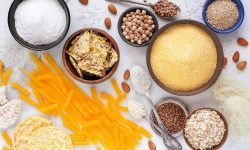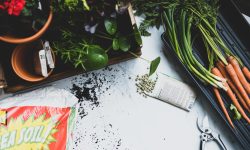Favourite Gluten-Free Items Available at Spud May National Celiac Awareness Month, but every day Spud…
Do you know someone who is vegan, plant-based, or just trying to reduce their meat and dairy consumption? There’s a good chance you do, especially if you’re under 35. Interest in reducing meat and dairy consumption has been growing over the past decade. Our blog posts about how to bake without eggs, high protein vegan foods, dairy-free ranch dressing, and how to make seitan have all garnered a lot of attention. Veganism and plant-based eating are on the rise, but what does it actually mean when your dinner guest says they follow one of these diets?
Vegan
The term ‘vegan’ has been around since the 40s and in this time has become much more well defined than plant-based. While it was initially created to define a vegetarian diet without dairy, it has since evolved into a lifestyle choice that is shaped by the tenet of reducing harm – usually to animals, but sometimes extended to the environment and social causes. This is how the Vegan Society defines veganism:
“A philosophy and way of living which seeks to exclude—as far as is possible and practicable—all forms of exploitation of, and cruelty to, animals for food, clothing or any other purpose; and by extension, promotes the development and use of animal-free alternatives for the benefit of humans, animals and the environment. In dietary terms it denotes the practice of dispensing with all products derived wholly or partly from animals.”
In practice this means that vegans not only do not consume animal products (dairy, honey, eggs, etc.) but they also don’t purchase products made from animals (like leather, silk, or wool) or products that are tested on animals (such as cosmetics or cleaning products). They are also likely to abstain from activities that might exploit animals, like zoos and riding elephants as a part of tourist activities.

Plant-Based
From the get-go, I’m going to recommend that if someone tells you they are plant-based and you aren’t sure what they mean, ask. It’s a newer term and its meaning can be a bit all over the board, so I’m going to go over a few possible options.
Option 1
A diet that is comprised of primarily plants, usually minimal/no processed food, and possibly some animal products. This is probably the least common option that I have encountered.
Option 2
A vegan diet that focuses on unprocessed whole foods – usually only referring to diet rather than lifestyle. Sometimes called a whole-food, plant-based diet. The reason behind partaking in this diet is usually health related.
Option 3
A vegan diet that does not include how you should eat (other than no animal products), but does not necessarily extend to lifestyle choices. This is the most common definition, and is generally seen as a more inclusive term than vegan.
This isn’t an exhaustive list of options, but these are some of the possibilities. It is also important to note that this might not be everyone’s understanding of these terms and the safest way to clarify what someone means is to ask.
All that being said (and speaking as someone on the plant-based/vegan spectrum), I would encourage inclusion and compassion for anyone who is trying to reduce their consumption of animal products in any manner. With labels and rules it can become commonplace to chastise individuals who do not live up to expectations. In my experience, the “vegan police” can do more harm than good. If you are a vegan or plant-based, I encourage you to approach others who may not agree with you with positivity and an open mind. If you are someone who is not vegan/plant-based, but looking to reduce your consumption of animal products, I applaud your effort and encourage you to continue.
Do you have a different experience with these terms? Feel free to let us know in the comments below!
*I should also note that I have used the word ‘diet’ throughout to define a way of eating, not as a restrictive form of eating with the purpose of losing weight.





